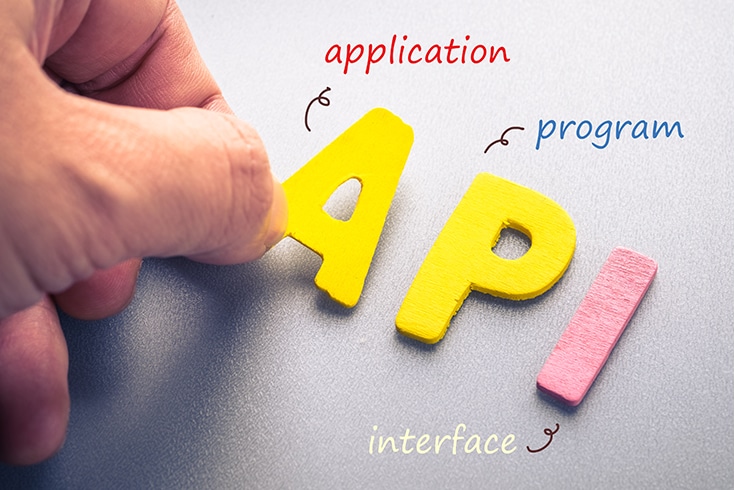What are the Points to Note in an Alliance Agreement for Implementing APIs? An Explanation for Each Clause

With the proliferation of smartphones, apps have now become an essential tool.
In recent times, not only standalone apps, but also systems called APIs, which link and share multiple apps like Facebook and Instagram, are increasingly being developed.
In this article, we will explain the key points of partnership contracts that are concluded when implementing APIs, targeting those who are considering implementing APIs.
https://monolith.law/corporate/partnership-contract-point[ja]
What is an API?

An API, or Application Programming Interface, is a term derived from the initial letters of its English name. It refers to a system that exposes applications and the like to the outside, allowing them to be integrated and shared with applications developed by others.
Thanks to APIs, applications can be connected to each other, enabling the use of each other’s functions and increasing their utility.
Specific Examples of Partnerships Utilizing APIs
Even though you may understand the definition of an API, it can be hard to visualize without concrete examples.
APIs can be used in various ways, such as sharing and linking member data like Facebook and Instagram, or utilizing online payment functions provided by others on your own e-commerce site.
Among the many APIs available, this article will explain the key points to check in partnership agreements, using the example of a case where a search service function provided by another party is made available to customers.
About Search Service APIs
For instance, let’s say Mr. A operates a review site for law firms.
Mr. A’s site operates on a system where users post reviews. However, as the number of users increased, the number of reviews also increased, leading to the problem of users taking a long time to find the reviews they were looking for.
Therefore, Mr. A wanted to implement a function that would allow users to search for specific reviews from the information on the site. He decided to enter into a contract regarding a partnership with Mr. B, who develops search services.
In the above example, the contract concluded between Mr. A and Mr. B would be the partnership agreement.
Key Points to Check in Alliance Contracts

In the following, we will present and explain the clauses that are expected to be problematic when concluding an alliance contract.
Provisions on API Usage Terms
It is necessary to stipulate provisions regarding the scope of API usage in the partnership agreement.
If the scope of API usage is not clearly defined, there is a possibility of future disputes over the scope of API usage.
Also, it is necessary to stipulate whether the use of the API is exclusive or non-exclusive.
For example, in the above case, Mr. A would want to use the search service developed by Mr. B exclusively, as he finds it attractive.
On the other hand, Mr. B might want many people to use the service he developed, and in that case, he would want Mr. A’s usage to be non-exclusive.
Therefore, the following provisions can be considered for the terms of API usage.
Article ● (Use of this API, etc.)
1. Party B grants Party A a non-exclusive license to use this API within the scope of providing the law firm review site operation service (hereinafter referred to as “this service”).
2. Party A may grant a re-use license to members who have registered as members by the method specified by Party A, for the purpose of using this service, within the scope of providing this service with respect to this API.
3. In the case of the preceding paragraph, Party A shall bear the responsibility according to the provisions of this agreement for the actions of the members, and shall ensure that the members comply with the provisions of this agreement.
4. Party B grants Party A the right to use this API only within the scope stipulated in this agreement, and Party A does not acquire any copyright, patent rights or other intellectual property rights, ownership rights or other rights related to this API, its derivatives, and the data provided by this API.
Provisions Regarding API Usage Fees

Provisions related to money are often the source of disputes.
Therefore, to prevent such disputes, it is crucial to clearly define the API usage fees.
For search service APIs, there are stages such as performing a search, displaying a list of search results, and checking the details of search results. Therefore, it is possible to set usage fees for each stage.
For example, the following provisions can be considered:
Article ● (License Fee)
1. Party B shall provide the API to Party A at the license fees specified in the following items:
(1) Review Search Fee
Regardless of the number of reviews displayed in the search results when a member uses this API to search for reviews, a fee of 5 yen (excluding tax) will be charged per search by the member.
(2) Review Viewing Fee
When a member views the details of a review displayed in the search results, a fee of 50 yen (excluding tax) will be charged per review viewed.
(3) Minimum Monthly Usage Fee
If the monthly license fee calculated according to the preceding items is less than 10,000 yen (excluding tax), the monthly license fee for this service will be 10,000 yen (excluding tax).
2. The amounts specified in the preceding items can be changed with the consent of both Party A and Party B.
3. Party A is free to set the price for the service provided to members using this API.
Article ● (Payment Terms)
1. The license fee will be calculated from the first day of each month, with the end of the same month as the closing date.
2. Party B will calculate the monthly license fee for the period specified in the preceding paragraph and issue an invoice detailing the breakdown of the monthly license fee to Party A by the 5th of the following month.
3. If Party A has no objections to the breakdown of the monthly license fee on the invoice in the preceding paragraph, Party A shall pay the monthly license fee (excluding tax) listed on the invoice to the bank account designated by Party B by the end of the same month as the closing date specified in paragraph 1. The bank transfer fee will be borne by Party A.
4. If Party A has objections to the breakdown of the monthly license fee on the invoice in paragraph 2, Party A shall notify Party B within 5 business days after receiving the invoice, and the monthly license fee will be determined through discussions between Party A and Party B. If Party A does not notify Party B of any objections within 5 business days after receiving the invoice, Party A is deemed to have no objections to the breakdown of the monthly license fee.
Provisions on Intellectual Property Rights

When using APIs, there is a possibility that copyrighted works may be created in the process.
Therefore, it is necessary to establish provisions regarding intellectual property rights.
The provisions on intellectual property rights could be as follows:
Article ● (Ownership of Intellectual Property Rights)
Party B grants to Party A only the right to use the API within the scope defined in this Agreement. Party A does not acquire any copyrights, patent rights, other intellectual property rights, ownership rights, or other rights related to the API, its derivatives, and the data provided by the API.
Prohibited Actions Clause
When allowing the use of an API, it is necessary to prevent the other party from obtaining information about the API.
Also, it is necessary to prohibit the act of allowing a third party to use the API without permission.
Therefore, it is important to clearly define prohibited actions in relation to the use of the API.
Specifically, the following clauses can be considered.
Article ● (Prohibited Actions)
Party A shall not engage in any of the following actions:
(1) Replicating, modifying, or reverse engineering, such as decompiling or disassembling, all or part of the system or program of Party B accessed via this API (hereinafter referred to as “Party B’s System, etc.”, including information about these contents)
(2) Licensing, selling, lending, transferring, disclosing, or leasing Party B’s System, etc. to a third party
(3) Removing or modifying Party B’s copyright notice and other rights notices attached to Party B’s System, etc.
(4) Infringing on the intellectual property rights of Party B, Party B’s affiliates, other licensees of this API other than Party A, or any third party, damaging their property, credit, reputation, etc., and infringing on their privacy rights, portrait rights, and other rights
(5) Connecting to the verification environment for purposes other than operation confirmation and connection testing
(6) Implementing API integration without passing the inspection deemed necessary by Party B
(7) Using Party B’s trademarks, company name, and logos, etc. without obtaining Party B’s prior written consent
(8) Using this API and its derivatives for purposes other than those for which permission was obtained from Party B
(9) Making the internet access point unclear
(10) Actions that violate various laws and regulations, or rules related to this service or API integration
(11) Actions that significantly increase the load on Party B’s System, etc.
(12) Actions that interfere with the access of third parties who have received permission to use this API from Party B
(13) Actions that are contrary to public order and morals, cause significant discomfort to others, or are likely to increase Party B’s reputational risk
(14) Actions that compromise the safety of Party B’s System, etc., such as infecting Party B’s operated sites, servers, Party B’s System, etc. with computer viruses, hacking, tampering, or other unauthorized access
(15) Actions similar to the preceding items
Summary
We have explained the key points to check in the partnership agreements concluded when implementing APIs.
It is expected that API partnerships will continue to increase in the future. Therefore, it is necessary to fully understand the key points of the contract.
Furthermore, it is important to explicitly state prohibited actions in the contract to prevent infringement of rights by the other party.
For the creation and revision of partnership agreements concluded when implementing APIs, specialized knowledge is required, so we recommend consulting with a specialist lawyer.





















